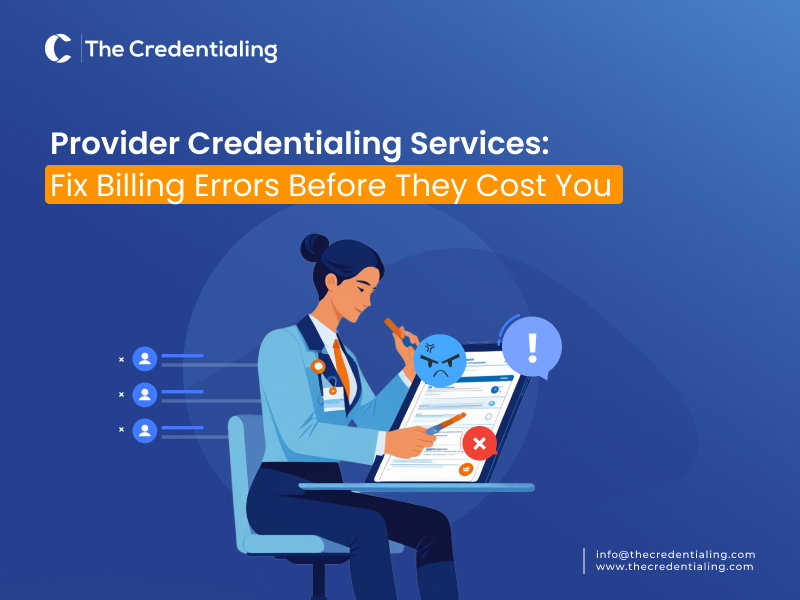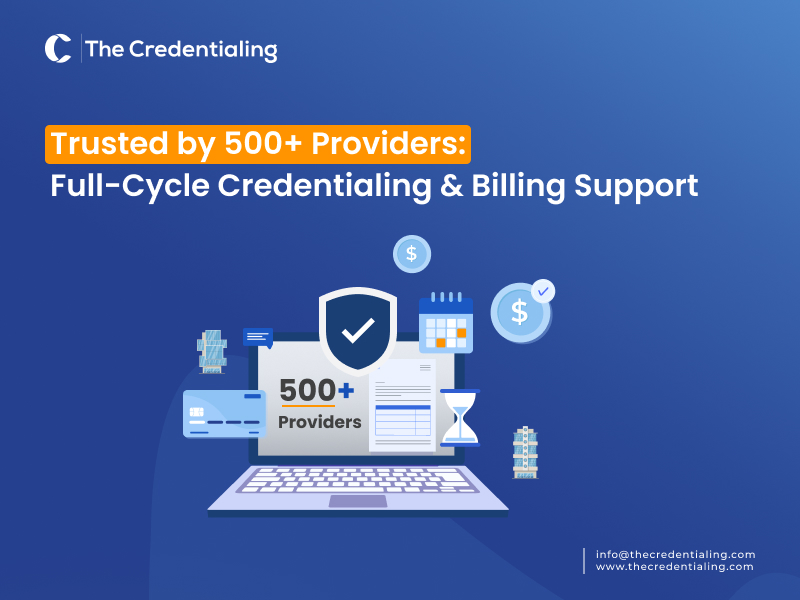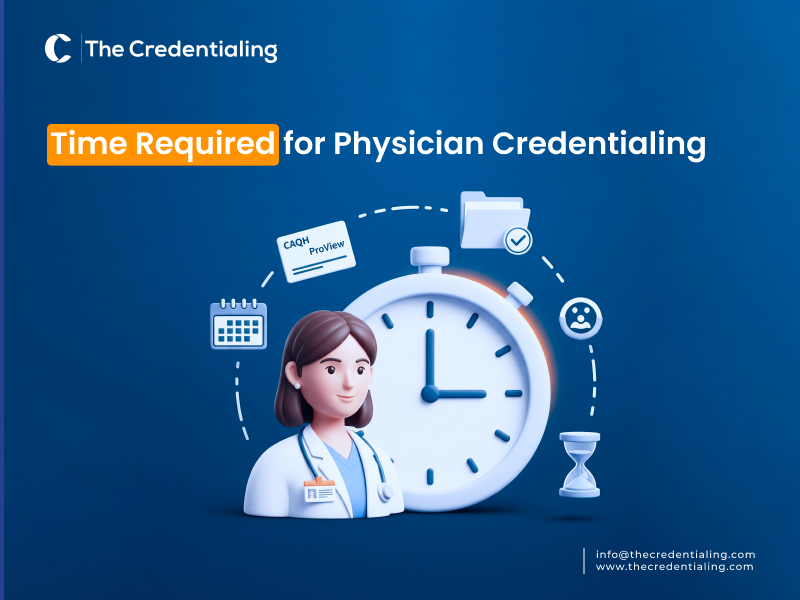Provider Credentialing Services: Fix Billing Errors Before They Cost You
Avoid costly billing errors with our expert provider credentialing services. Ensure compliance, speed up reimbursements, and streamline your practice today
Schedule Free Demo Today
Establishing a strong patient base, receiving fair rates in reimbursement from insurance companies, and retaining the healthcare practice's care credibility requires healthcare professionals to stay updated with their credentials.
Yet, medical billing is the key component to be performed with due care and scrutiny as it ties the reimbursement flow by the insurance companies. So, the errors are never to be compromised, nor is there room for credentialing delays. On the other hand, insurance companies rely on the accuracy of provider credentialing information to proceed with the claims' payment.
Considering the significance of credentialing and billing, the more accurate the practice of credentialing, the finer the level and ability of the provider to manage billing and claims to be rightly handled. In contrast, errors in credentialing result in setbacks in practice medical billing and revenue cycle management. The statistical data reveals that credentialing issues account for nearly 80% of claim denials, along with 40% of providers facing revenue losses due to credentialing inefficiencies.
Hence, when identified, it's time to focus on key practices to avoid the rework on denied claims and extended payment cycles. Make sure your practice care providers are duly credentialed with insurance to maintain the practice revenue and keep expanding the patient base with the right steps.
Follow this article's guide to focus on key strategies preventing billing errors resulting from credentialing issues. Learn the emerging trends if you are concerned about how to fix medical billing mistakes. Plus, ensure explanations about automation to in-credentialing and efficient enrollment to help stop revenue leaks while ensuring smooth billing operations.
What is Credentialing in Billing: Understanding the Critical Role of Physician Accreditation!
Provider credentialing, also known as doctor or physician credentialing, is a structured method of verifying the healthcare provider's credentials, such as licensing, work history, qualifications, and more.
Credentialing ensures the confidence of several entities involved in healthcare, including the practice professionals, to provide quality care, ensure that patients have safe treatment and billing, and, on top of all, ensure that insurance companies proceed with claim reimbursement. Hence, it is of utmost importance to meet the credentialing criteria set by insurance companies and other regulatory bodies.
In the process of medical billing, credentialing ensures that the providers are recognized by the insurance companies to have smooth and timely claim processing and reimbursement. The top advantage of medical billing and credentialing is that it ensures a stable financial status due to the handling of revenue by qualified professionals.
Moreover, a credentialed provider stays up-to-date with regulatory standards like the National Committee of Quality Assurance (NCQA) Such authoritative departments ensure guidelines to bill patients with accuracy and avoid the risk of billing discrepancies. Hence, the administrative workload is significantly reduced with the process efficiency. Following are some other crucial benefits to consider in provider credentialing in medical billing:
Credentialing Instills Confidence in Care Delivery
Credentialing in medical billing is important since it elevates the patient and practices confidence in safe care delivery and outcomes. Medical billing along credentialing are tied to each other since both play a significant role in patient care delivery and getting reimbursed. Moreover, the healthcare providers' credentials with certain reputable insurance companies increase the chance of patient satisfaction.
Credentialing Prevents Revenue Loss
A credentialed care provider offers timely and effective care while taking care of the care continuity without disrupting the patient services. Resultantly, the chances of revenue loss shrink in the practice. Moreover, some of the medical offices function in partnership with insurance providers, and credentialing ensures the practice verification at various intervals to ensure the active status of the partnership.
Credentialing in Hiring Efficient Billers
In the process of recruitment, credentialing plays a key role for professionals. Through the detailed verification of a provider's credentials like licenses, qualifications and certifications, the practices secure the proof of a candidate's eligibility. Moreover, the successful validation of these steps ensures that the providers get into a contract with the insurance company.
Credentialing in Improving Practice Reputation
Credentialing keeps increasing the practice's reputation as it provides the source of reputation for patients and insurance providers. Credentialing also ensures patients the access to information and assesses providers that they are getting care and treatment from. Plus, the credentialing helps patients track the status of their care quality, which helps in gaining trust and confidence.
Credenting Also Saves Cost
Amidst the competitive phase between hospitals and private medical practitioners facing several retrains. Hence, the credentialing saves professionals' costs using the automation software to streamline the process.
What Credentialing Problems Cause Billing Errors in Practice?
Provider credentialing issues, such as delays, significantly impact the practice's billing and revenue levels. Be wary of some of the crucial credentialing errors that should be addressed before the operation to decrease billing discrepancies.
Lack of Experts to Manage Credentialing Tasks
The proper verification of provider credentials is more critical than it sounds, as it takes crucial attention to detail in the process, such as verification of certification and licenses, while contacting the primary sources. Many of the practices take credentialing for granted to ensure responsibilities to the billing team. However, hospitals and healthcare organizations may not do so just due to the process's complexity and the lack of essential resources or expert staff to complete the medical credentialing process.
Insufficient Data on Provider Credentialing Applications
At times, when credentialing is in the hands of the billing team, providers' data is incomplete when submitted to insurance providers. On the other hand, insurance companies do not consider incomplete information in credentialing applications to proceed further with claims payment. Moreover, data recovery takes time to get claims paid and reimbursement issued to the providers.
Providing Care Before the Completion of the Credentialing Process
Many of the doctors start providing care before the credentialing process reaches its final stage. Even though you have submitted the application, providing care before the process completion may cost you penalties such as ruled in many states.
Recredentialing or Revalidation is Also a Necessary Step
Once you are getting credentialed following the required criteria, it is also necessary to keep updating your credentials, including the board certifications and licenses. Recredentialing every three years is a must since it ensures that you are providing those services that you are certified for or have a license of.
Credentialing-Related Denials and Financial Impact
In the process of medical billing, credentialing-related denials occur when the insurance credentialing company refuses to reimburse claims due to incomplete data on the provider's credentials. For instance, the missing or expired licenses or certifications. Such types of denials commonly occur due to the main cause of missing information or when the provider doesn't meet the specific insurance payer requirements for credentialing.
However, the resolution is possible with some key steps, such as thoroughly verifying that all the credentials submitted are accurate and up-to-date, that the provider file contains authentic documents, and conducting regular reviews of the documents to ensure compliance with the regulatory requirements. Make sure you are aware of the varying insurer requirements for credentialing and communicating the necessary changes if they occur during the process.
What's the Financial Impact?
- Credentialing errors contribute to 80% of claim denials, leading to significant revenue loss.
- Claims tied to uncredentialed providers take weeks or months to get resolved, disrupting cash flow.
- Reworking denied claims costs providers an average of $25 per claim, increasing operational expenses.
- Incorrect credentialing can lead to payer audits, penalties, or even contract terminations.
- Denials may force providers to delay treatments or offer uncompensated care, affecting service quality.
- Unresolved denials often result in bad debt, reducing overall financial stability.
Expert Solutions to Prevent Common Medical Billing Errors
These proven practices will help your practice tighten up claims processing and fix the billing process:
- Improve your patient registration and scheduling through the effective training of your frontline staff to collect comprehensive data on patient demographics.
- Manage pre-authorizations with the integration of technology and assign individual pre-auth responsibilities.
- Invest in staff training on teaching coding best practices and keeping up-to-date with the regulatory changes. Plus, reinforce the usage of correct CPT & ICD-10 codes and modifiers through audits and reviews.
- Ensure coding accuracy through the utilization of technology, including computer-assisted coding engines and encoders.
- Automate claims management such as claim status tracking, denials analytics, and rules-driven workflows to reduce billing cycles.
Your Practice Needs Conscious Credentialing Services
Being time-conscious is always the best strategy in the credentialing process. Make sure you are thoroughly vetting all new practitioners and providers following the established standards without rushing. Make sure you are contacting references to review the provider records and save the time-consuming process.
Avoid Credentialing Denials
This is by simply avoiding the communication delays that can occur between providers and insurance companies. Though many of the larger organizations take the responsibility of their credentialing on their own, there are still the red flags to count on. Hence, it is better to involve a third party in your practice provider credentialing to avoid such hassles.
Update Important Documents
Moreover, a big number of medical certifications require periodic revalidation to meet the rigid criteria set by varying insurance companies. The step may take a significant time for the provider's documents to be validated.
Plus, the varying credentialing requirements for insurance payers cause confusion, so, best way to tackle this is to keep a clear list of insurance company updates on documentation. This will help you distinguish between types of institutions, such as state-run or private.
Address Potential Delays and Prepare Accordingly
Make sure you are addressing all potential delays and be prepared accordingly. Time is an important factor, especially when credentialing and coding practice contain errors. It takes longer to review the error, and it impacts the consistency of the revenue stream. Make sure you are identifying every detail before the insurance company finds out the details that need review to reduce the waiting time before payment verification.
Furthermore, you should not fail to correctly predict the provider's approval by mentioning the time requirement. For instance, many insurance companies have a high workflow that may be out of your low-priority range. So, make a win-win by giving your practice at least 90 days from the requested date to the time expected for approval. You can directly contact the insurance payer in case of any query to resolve it upfront.
In case your practice faces multiple denials, take immediate action to reduce the number. Create a report and record the underlying factors and errors that are problematic for the approval. A critical organization and identification of errors will lead you to elimination and improvement.
Outsourcing with TheCredentialing Can Fix Your Billing Errors With Enhanced Revenue Efficiency
Whether you are a startup or an extended established healthcare practice, consider outsourcing a viable solution to your every billing problem. TheCredentialing is one of the top-rated credentialing companies that can get you verified with any type of insurance, including Medicare, Medicaid, or Commercial Insurance.
These credentialing experts will enroll you with the insurance following the varying credentialing and validation requirements. Moreover, we accelerate your provider enrollment and provider credentialing services through the automated TheCredentialing portal. Save your time and credentialing services pricing while experiencing efficient credentialing without delays in approvals and physical efforts of documentation.
TheCredentialing keeps your practice thriving with all types of efficiency and process healthcare compliance.
Sit Back and Relax! Let The Pros Handle Credentialing For You!
thecredentialing has built a strong portfolio while providing credentialing services to clients over the years. Our service includes helpful features that you won’t find anywhere else.
Schedule Free Demo Today!

